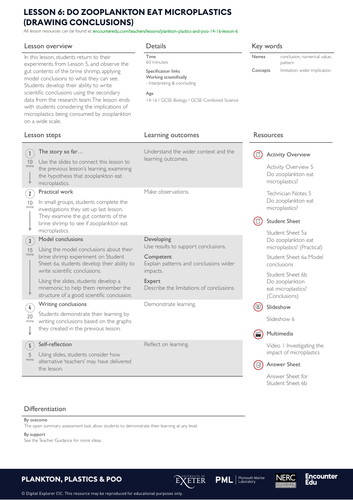







This lesson supports students to develop the ‘writing scientific conclusions’ component of working scientifically for GCSE. It is based on current research being conducted by Exeter University and Plymouth Marine Laboratory.
In this lesson, students return to their experiments and observe the gut contents of the brine shrimp, applying model conclusions to what they can see.
Students develop their ability to write scientific conclusions using the secondary data from the research team. The lesson ends with students considering the implications of microplastics being consumed by zooplankton on a wide scale.
This full lesson includes:
Lesson Overview & Teacher Guidance
Slideshow 6 Do Zooplankton eat microplastics? (Conclusions)
Student Sheet 5a Do zooplankton eat microplastics? (Practical)
Student Sheet 6a Model conclusions
Student Sheet 6b Do zooplankton eat microplastics? (conclusions)
Activity Overview/Technician Notes 5 Do zooplankton eat microplastics
Answer Sheet for Student Sheet 6b
This is Lesson 6 of 7 in the Plankton, Plastics and Poo unit of work, which is based on current research being conducted at the University of Exeter and Plymouth Marine Laboratory. The unit consists of enquiry-based lessons which support students to work scientifically by simulating the researchers’ investigations, and encourages students to the use their findings to have a wider impact.
The resource uses innovative methods to bring cutting edge science to the classroom, including:
- Using real field and laboratory data.
- Practical investigations that replicate the work of the scientists.
- Using social media to connect with the scientists.
- The opportunity to connect with scientists through Skype in the classroom events.
All lessons and resources are available from Encounter Edu’s TES profile.
Something went wrong, please try again later.
This resource hasn't been reviewed yet
To ensure quality for our reviews, only customers who have downloaded this resource can review it
Report this resourceto let us know if it violates our terms and conditions.
Our customer service team will review your report and will be in touch.